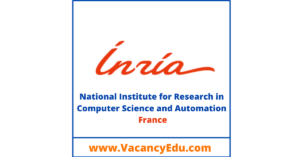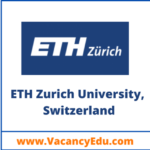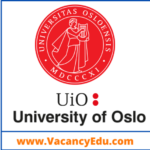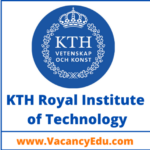Inria, France invites online Application for number of Fully Funded PhD Degree at various Departments. We are providing a list of Fully Funded PhD Programs available at Inria, France.
Eligible candidate may Apply as soon as possible.
(01) PhD Degree – Fully Funded
PhD position summary/title: PhD Position F/M Stochastic modelling of dynamical resource allocation and analysis of single-cell data
The Centre Inria de l’Université de Grenoble groups together almost 600 people in 22 research teams and 7 research support departments.
Staff is present on three campuses in Grenoble, in close collaboration with other research and higher education institutions (Université Grenoble Alpes, CNRS, CEA, INRAE, …), but also with key economic players in the area.
The Centre Inria de l’Université Grenoble Alpe is active in the fields of high-performance computing, verification and embedded systems, modeling of the environment at multiple levels, and data science and artificial intelligence. The center is a top-level scientific institute with an extensive network of international collaborations in Europe and the rest of the world.
Deadline :2025-09-30
(02) PhD Degree – Fully Funded
PhD position summary/title: PhD Position F/M Development and validation of small-scale models of metabolite production in bacteria
The PhD project will be carried out in the project-team MICROCOSME at the Centre Inria de l’Université de Grenoble Alpes and the Laboratoire Interdisciplinaire de Physique (LIPhy, CNRS/UGA) under the joint supervision of Hidde de Jong (https://team.inria.fr/microcosme/hidde-de-jong/) and Noël Scaramozzino (https://liphy.univ-grenoble-alpes.fr/fr/recherche/equipes/biop-fluctuations-regulations-et-evolution-systemes-vivants) within the framework of the project MuSiHC supported by the PEPR B-BEST (https://anr.fr/en/france-2030/call-for-proposals-details/call/pepr-b-best-biomasses-biotechnologies-et-technologies-durables-pour-la-chimie-et-les-carburants-1/). MICROCOSME and LIPhy provide an interdisciplinary research environment fostering close collaborative interactions between applied mathematicians, microbiologists, computer scientists, control engineers, and biophysicists.
Deadline : 2025-09-30
View All Fully Funded PhD Positions Click Here
(03) PhD Degree – Fully Funded
PhD position summary/title: PhD Position F/M Resilient network communications, tolerant to failures and volatility, and suited for artificial intelligence applications.
In TOPAL, we’re tackling the evolving challenges at the intersection of high-performance computing (HPC), numerical simulation, and machine learning. As computing platforms grow in scale and complexity—featuring millions of cores and diverse hardware like GPUs—we’re leveraging our long-standing expertise in dynamic runtime systems to make the most of these resources. Our work helps adapt to unpredictable workloads and optimize task scheduling without relying on rigid, pre-planned execution. We’re now extending this know-how to emerging applications like deep neural network training, which places unique demands on both computation and memory. At the same time, we’re addressing the urgent need to reduce energy consumption and carbon footprint in HPC. That means rethinking algorithms, data movement, and hardware use to build more sustainable systems. A key focus for us is efficient data management, since moving and storing data is increasingly more costly than computing itself. By combining our background in linear algebra, resource scheduling, and algorithmic optimization with these new demands, we’re shaping the future of scientific computing on next-generation platforms.
Deadline : 2025-09-30
(04) PhD Degree – Fully Funded
PhD position summary/title: PhD Position F/M Memory minimization for neural networks
In this proposal we want to tackle the problem of memory minimization when sequentially executing tasks (representing processes, programs, blocks of code, instructions, . . . ) with data dependencies, represented as a dataflow task graph. This is critical for applications such as large neural networks that require huge amounts of memory space. To execute a set of tasks on a given system, the highest memory demand, i.e., the memory peak, of the tasks must be smaller than the memory available on the system. The memory peak is the maximum amount of live data at any time; this is the size of data produced by the tasks so far, and which are required for the computations of further tasks. Three techniques can be used and combined to meet such memory constraint:
- scheduling: to schedule tasks according to their impact on memory (for example, tasks consuming data and decreasing the amount of live memory should be executed as soon as possible);
- offloading: to move live data to a slower but larger upper-level memory (e.g., cache, RAM, disk), and reloading them when required, which gives the opportunity to execute another data intensive task in between;
- recomputing (aka rematerialization): to erase and recompute data, by re-executing the tasks having produced more data than they consumed, and keeping their (smaller) input data live instead of the (larger) output one, which also gives the opportunity to execute another data intensive task in between.
Considering all three techniques, scheduling, offloading, and recomputing, gives rise to trade-offs between the minimization of the memory peak and the execution time; this problem is challenging and PSPACE-complete.
Deadline : 2025-09-30
(05) PhD Degree – Fully Funded
PhD position summary/title: PhD Position F/M Augmented Reality for Situated Outdoor Geospatial Data Visualization
Augmented Reality (AR) superimposes information in the user’s field of view and is particularly relevant to outdoor contexts of use, where users can access digital data and seamlessly relate those data to their physical surroundings. This can be useful for leisure activities (outdoor games, tourism), but in a variety of work contexts as well such as urban planning, construction work, and a variety of scientific activities.
To take one particular example, geologists often need to access data about the location they are currently visiting: terrain models, soil sample data analyses, databases and documents about the area, including maps. Augmented Reality can provide effective support to such users, by enabling them to display data in their field of view, directly integrating digital information with the physical environment. Users can then interact with the virtual content using freehand gestures, combining them with pen-based input on a handheld tablet when relevant.
However, designing visualization techniques for such outdoor contexts raises multiple challenges that stem from the scale of the physical environment considered, varying outdoor conditions (weather, natural light), the need for geologists to effectively switch between different situations, and the need for geologists to orient themselves and plan the next steps of their terrain explorations, among many others.
The goal of this PhD is to design, prototype and evaluate interaction techniques and visualization techniques to effectively support geologists in the field, addressing the above challenges using combinations of interactive devices: augmented reality eyewear; handheld tablets and digital pens; and a combination thereof.
Deadline : 2025-09-30
Polite Follow-Up Email to Professor : When and How You should Write
Click here to know “How to write a Postdoc Job Application or Email”
(06) PhD Degree – Fully Funded
PhD position summary/title: PhD Position F/M Filippov Solutions for Discontinuous Differential-Algebraic Equations (DAEs): Control and Simulation
The Inria Rennes – Bretagne Atlantique Centre is one of Inria’s eight centres and has more than thirty research teams. The Inria Center is a major and recognized player in the field of digital sciences. It is at the heart of a rich R&D and innovation ecosystem: highly innovative PMEs, large industrial groups, competitiveness clusters, research and higher education players, laboratories of excellence, technological research institute, etc.
Deadline : 2025-09-22
(07) PhD Degree – Fully Funded
PhD position summary/title: Doctorant F/H Modélisation de données de contamination environnementale issues de méthodes d’analyse non-ciblées
Approche existante. Cet objectif global est actuellement traité en deux grandes étapes dans la littérature. Une première étape de pré-traitement, concomittante à l’acquisition des spectres, consiste à réduire l’ensemble du spectre à une matrice position/intensité résumant l’information moléculaire de l’échantillon. Cette matrice est ensuite utilisée, dans une deuxième étape, comme entrée de modèles d’apprentissage classiques, dans un cadre supervisé ou non, pour expliquer/prédire un événement ou identifier des profils d’individus. Une telle approche présente plusieurs limites. En premier lieu, le pré-traitement des spectres par ces méthodes sont composées de plusieurs étapes. Ces différentes étapes dépendent de nombreux paramètres à spécifier et accroissent de ce fait la subjectivité liée à l’utilisateur. Un des défis est donc de chercher à réduire ce nombre de paramètres ou d’automatiser leur choix. Par ailleurs, chaque étape est source d’erreurs statistiques qui ne sont que peu quantifiées ou prises en compte dans les méthodes existantes. Il est ainsi nécessaire de quantifier l’incertitude découlant de chaque étape du processus de traitement comme un moyen d’assurer une meilleure évaluation de la qualité des données.
Ce projet de thèse, en collaboration avec l’IRSET, vise à développer une approche plus globale afin de réduire les étapes de prétraitement et l’incertitude découlant des erreurs propagées par les étapes successives. Pour ce faire, nous proposons une modélisation fonctionnelle du spectre à l’aide de bases de fonctions flexibles et adaptées aux caractéristiques des spectres acquis. Parmi les difficultés liées aux spectres, une première est que les pics observés de ces données de LC-HRMS pour les différents individus ne sont pas correctement alignés, nous pourrons intégrer dans nos modèles une étape d’alignement basé sur le transport optimal et la distance de Wassertein. Par ailleurs, les polluants présents dans les échantillons biologiques correspondent généralement à des pics de petite taille dont l’intensité est proche du niveau du bruit, notre modèle devra donc en tenir compte afin de séparer les pics associés à des molécules réelles de ceux correspondant à du bruit.
Enfin, les différentes variabilités, telles que celles dues aux différentes techniques des laboratoires, ou structures de groupes seront prises en compte dans le modèle final à l’aide d’effets mixtes. Nous définirons également un terme de pénalité spécifiquement adapté à la sélection de portions de courbes.
Cette modélisation nous permettra d’identifier, sans a priori, les polluants dont l’effet est le plus significatif sur un événement de santé et pourra être adaptée au cas où la variable d’intérêt est une durée de vie telle que le décès ou l’apparition d’un cancer.
Deadline : 2025-09-22
(08) PhD Degree – Fully Funded
PhD position summary/title: PhD Position F/M Hardware Acceleration for Unmanned Aerial Vehicle Control Algorithms
A PhD is not a continuation of coursework or a natural next step after a Master’s degree. A PhD is a long-term, research-focused commitment that requires deep curiosity, self-motivation, resilience, and a certain degree of autonomy.
By research, we mean creating new knowledge, not just applying existing theories. Your task is to discover, design, or prove something that no one has done before—work that will become what future students study.
If you are mainly looking for structured classes, predefined assignments, or a repeat of your Master’s experience, you will likely find this path unfulfilling. We welcome applications from candidates who are excited by uncertainty, driven to ask original questions, and eager to shape the frontier of their field.
Deadline : 2025-09-15
Click here to know “How to Write an Effective Cover Letter”
(09) PhD Degree – Fully Funded
PhD position summary/title: PhD Position F/M PhD position on constructive reverse mathematics
The prospective student should have a background in interactive theorem proving in the proof assistant Rocq, a background in model theory, and a background in constructive mathematics.
Deadline : 2025-09-15
(10) PhD Degree – Fully Funded
PhD position summary/title: PhD Position F/M Topology Design for Decentralized Federated Learning
This PhD thesis is in the framework of Inria research initiative on Federated Learning, FedMalin https://project.inria.fr/fedmalin/.
The PhD candidate will join NEO project-team https://team.inria.fr/neo/.
NEO is positioned at the intersection of Operations Research and Network Science. By using the tools of Stochastic Operations Research, the team members model situations arising in several application domains, involving networking in one way or the other.
Deadline : 2025-09-13
Connect with Us for Latest Job updates
(11) PhD Degree – Fully Funded
PhD position summary/title: PhD Position F/M (Optimal) adaptive testing for clinical trials
The Inria University of Lille centre, created in 2008, employs 360 people including 305 scientists in 15 research teams. Recognised for its strong involvement in the socio-economic development of the Hauts-De-France region, the Inria University of Lille centre pursues a close relationship with large companies and SMEs. By promoting synergies between researchers and industrialists, Inria participates in the transfer of skills and expertise in digital technologies and provides access to the best European and international research for the benefit of innovation and companies, particularly in the region.For more than 10 years, the Inria University of Lille centre has been located at the heart of Lille’s university and scientific ecosystem, as well as at the heart of Frenchtech, with a technology showroom based on Avenue de Bretagne in Lille, on the EuraTechnologies site of economic excellence dedicated to information and communication technologies (ICT)
Deadline :2025-09-10
Polite Follow-Up Email to Professor : When and How You should Write
(12) PhD Degree – Fully Funded
PhD position summary/title: PhD Position F/M Generalization bounds for neural networks
Understanding generalization in deep learning has been one of the major challenges in statistical learning theory over the last decade. While recent work has illustrated that the dataset and the training algorithm must be taken into account in order to obtain meaningful generalization bounds, it is still theoretically not clear which properties of the data and the algorithm determine the generalization performance. In this phd, we will approach this problem from a dynamical systems theory perspective and exploit the fractal structure that the stochastic optimization algorithms produce [1].
We aim to prove that the generalization error of a stochastic optimization algorithm can be understood by using fractal geometry and dynamical systems theory. The results will be evaluated on modern neural networks, and new efficient algorithms will be developed based on the developed theory.
Deadline : 2025-09-06
(13) PhD Degree – Fully Funded
PhD position summary/title: PhD Position F/M Embedded Machine Learning Programming – fully-funded PhD
Conventional machine learning (ML) frameworks offer a tensor-centric view of the design and implementation of deep neural networks. But ML models do not stand by themselves as pure tensor functions. ML applications typically interact with an environment and often operate on stream of data collected and processed over time. For instance, the reactive control of a self-driving car operates on streams of data coming from sensors and controlling actuators. Training algorithms themselves embed a model into a reactive loop, itself decomposed into epochs and (mini- )batches allowing the efficient scheduling of computations and I/O, parameter updates, etc. The same applies to reinforcement learning (RL) agents. Back to the automated driving example, stateful behavior is essential to taking into account previously-inferred facts such as speed limits, whether the current lane is a left turn etc., long after the acquisition of sensor inputs. Other examples of ML components embedded into stateful reactive feedback loops include model-predictive maintenance, control, and digital twins. ML models themselves involve stateful constructs in the form of recurrent neural network (RNN) layers. When generating optimized code, even matrix products and convolutions in feedforward networks can be folded over time, using (stateful) buffering to reduce memory footprint. In distributed settings, the efficient implementation of large models involves pipelined communications and computations, which amounts to locally recovering a streaming execution pattern.
Deadline : 2025-09-06
(14) PhD Degree – Fully Funded
PhD position summary/title: PhD Position F/M Conformal Prediction and Physics-Informed Machine Learning
This research project is funded by the ANR project MELISSA (MEthodological contributions in statistical Learning InSpired by SurfAce engineering). In MELISSA, members are conducting research in statistical machine learning, following the constraints, the physical background knowledge and the observations of physical phenomena involved in repeated laser impacts on surfaces.
The hired PhD student will be based in the Inria Magnet team (Lille, France) and will be jointly supervised by Marc Tommasi, Batiste Le Bars and Pierre Humbert (CNRS, LaMME, Evry, France). Together, they gather a world-leading expertise in Machine Learning and Conformal Prediction. This project will stimulate existing and emerging collaborations with other research groups on themes at the intersection between machine learning, statistics and physics. For instance, there will be opportunities to collaborate with other members of the MELISSA project in Saint-Étienne (Laboratoire Hubert Curien, Teams MALICE, Data Intelligence and Laser-Matter interaction) and Sorbonne University (Laboratoire ISIR, MLIA Team).
Deadline : 2025-09-01
(15) PhD Degree – Fully Funded
PhD position summary/title: PhD Position F/M Privacy-Preserving Collaborative Learning of Large Language Models Across Heterogeneous Learning Paradigms
The widespread deployment of Large Language Models (LLMs) has given rise to diverse adaptation paradigms that accommodate varying computational and infrastructural constraints. In addition to traditional full fine-tuning, emerging methods such as prompt-tuning, parameter-efficient tuning like LoRA (Low-Rank Adaptation), and in-context learning for model adaptation with reduced computational resources or without access to model weights. These approaches open up new possibilities for collaborative learning in privacy-sensitive contexts, where multiple clients aim to improve LLM performance without exposing their raw data.
This PhD thesis will focus on designing privacy-preserving collaborative learning strategies for LLMs, starting in a homogeneous setting, where all participants rely on the same adaptation paradigm. This initial step will build a foundation for tackling the more ambitious and impactful goal of heterogeneous collaboration, where clients operate under different adaptation regimes due to diverse privacy, computational, or architectural constraints. A central challenge of the project is to reconcile contributions from such heterogeneous clients in a unified learning process, while ensuring rigorous privacy guarantees—most notably through differential privacy (DP), which provides strong theoretical protections against data leakage. The thesis will also address the trade-offs between model utility and privacy risk and propose novel mechanisms specifically tailored to this multi-paradigm collaborative learning scenario.
The PhD candidate will be based at Inria Lille, within the MAGNET research team, and will be co-supervised by M. Tommasi, Dr. Raouf Kerkouche (Inria Lille) and Dr. Cédric Gouy-Pailler (CEA Saclay). The research will benefit from a stimulating scientific environment, combining Inria’s strong expertise in machine learning and artificial intelligence with the applied research focus of the CEA. This thesis is part of the REDEEM project, funded by the PEPR IA initiative (France 2030). It offers a highly interdisciplinary environment bridging machine learning, natural language processing, and privacy-enhancing technologies, with opportunities for national and international collaboration.
Deadline : 2025-09-01
(16) PhD Degree – Fully Funded
PhD position summary/title: PhD Position F/M Moving-target defense driven by artificial intelligence for cloud composite services
This PhD thesis will take place in the context of the TrustInCloudS project. This project is part of the CLOUD PEPR founded by the ANR, and targets the design of new solutions for the major cybersecurity challenges specific to cloud environments, in order to ensure the confidentiality, integrity and availability of data, applications and services. In particular, its main objective is to study and develop new methodologies to strengthen cloud security and implement them over prototyping platforms, in order to contribute to the development a sovereign and trusted cloud. The project is organized in such a way as to work on the one hand on the security of the infrastructures, and on the other hand on the security of the data (in the broad sense) that these infrastructures host. It will carry out scientific actions on these two main themes, with the objective of proposing new methods and tools for securing cloud infrastructures and their data. This theoretical work will lead, when relevant, to prototype implementations to prove the concept, including potential deployment over the shared infrastructures developed in the SLIDES project of the CLOUD PEPR.
Deadline : 2025-08-31
(17) PhD Degree – Fully Funded
PhD position summary/title: PhD Position F/M Stochastic modeling of single-cell plasmid copy number fluctuations
The project is part of the ERC Starting Grant of Jakob Ruess (Lifeware team at Inria Saclay). Inria is the French national institute for research in computer science, control, and applied mathematics promoting scientific excellence and technology transfer. Within this project, we primarily work on the development of mathematical modeling approaches and statistical inference/estimation methods but we also collaborate with biologists to apply our methods to real data. Our main long-term goal is to develop a comprehensive methodological framework supporting the development of a quantitative understanding of biochemical processes inside single cells that are coupled to the dynamics of growing cell populations. Our research topics are at the intersection of mathematical biology, statistics, control engineering, and statistical physics applied to problems in biology.
This job announcement is for a PhD position on the project but we are generally looking for young scientists at all career stages (internship, PhD, postdoc) to join the team at any time in 2025.
Deadline : 2025-08-31
(18) PhD Degree – Fully Funded
PhD position summary/title: PhD Position F/M Geometric statistics on stratified quotient spaces: topologically constrained multi-atlases for brain diffeomorphometry
The PhD project will take place at Inria Center of Université Côte d’Azur in the Epione team under the supervision of Xavier Pennec, in close collaboration with Mathieu Carrière in the Datashape team. This PhD is funded for 3 years as part of the project Meditwin where many teams from Inria, 3DS (Dassault Systemes), 7 IHUs (University Research Hospitals) and other partners contribute to build personalized virtual twins of organs, metabolism and cancer, for better diagnosis and treatment
Deadline : 2025-08-31
(19) PhD Degree – Fully Funded
PhD position summary/title: Doctorant F/H Méthodes de fusion multi-modale et multi-échelle basées sur l’apprentissage profond génératif
Le projet MediTwin est un projet d’envergure visant à développer des jumeaux numériques du corps humain pour aider à la prévention, au diagnostic et au traitement de différentes pathologies. Au sein de ce projet, plusieurs thématiques en modélisation et en analyse d’images médicales sont abordées, dont le sujet de la génération de données synthétiques.
Ce projet de thèse est sur le développement de méthodes d’apprentissage profond génératives afin d’augmenter les données disponibles sur un patient. L’idée est de pouvoir profiter de bases de données disponibles de haute qualité et de haute résolution, ou de multiples modalités pour améliorer et compléter les images disponibles en routine cliniques.
Ceci sera développé plus particulièrement pour l’imagerie cardiaque et dans le cadre de la stratification du risque d’arythmie, qui est une application de MediTwin. En effet, une connaissance détaillée du tissu cardiaque et notamment de l’infarctus responsable de troubles du rythme est un élément important dans une telle prédiction.
Deadline :2025-08-31
How to increase Brain Power – Secrets of Brain Unlocked
(20) PhD Degree – Fully Funded
PhD position summary/title: PhD Position F/M Modeling the dynamic behavior of implants used in total hip arthroplasty
The Inria centre at Université Côte d’Azur includes 42 research teams and 9 support services. The centre’s staff (about 500 people) is made up of scientists of different nationalities, engineers, technicians and administrative staff. The teams are mainly located on the university campuses of Sophia Antipolis and Nice as well as Montpellier, in close collaboration with research and higher education laboratories and establishments (Université Côte d’Azur, CNRS, INRAE, INSERM …), but also with the regiona economic players.
With a presence in the fields of computational neuroscience and biology, data science and modeling, software engineering and certification, as well as collaborative robotics, the Inria Centre at Université Côte d’Azur is a major player in terms of scientific excellence through its results and collaborations at both European and international levels.
Deadline : 2025-08-31
(21) PhD Degree – Fully Funded
PhD position summary/title: PhD Position F/M What Do GNNs Dream of ? An Interpretability Method Based on Pattern Extraction
Graph Neural Networks (GNNs) [1] have become increasingly popular in recent years due to their ability to process graph-structured data (e.g., social networks, molecules, knowledge graphs, etc.). These models have set the new state-of-the-art in tasks such as link prediction and graph classification, achieving impressive results compared to previous approaches. However, like other neural network-based approaches, GNNs suffer from a lack of interpretability: it is nearly impossible for a human expert to understand the reasoning behind a GNN’s decision.
While numerous explainability (XAI) methods have been proposed for traditional neural networks (e.g., those processing text or images) [2,3], very few works have focused on the case of graph data. In [4], a GNN explainability method based on pattern mining [5] was proposed. This method is unique in that it directly leverages the components activated during the GNN’s decision-making process, extracting patterns called “activation rules’’. These activation rules are then linked to the input graph data, enabling the generation of explanations in the form of subgraphs.
This preliminary method, however, has several limitations. First, the activation rules are only extracted for a single layer of the GNN, limiting their expressiveness. Additionally, non-activations are not taken into account, even though they can be crucial for explaining a decision. Another key limitation is the overwhelming number of activation rules generated, due to the combinatorial nature of the extraction process. A quality measure is therefore needed to select a relevant subset of rules. The current method uses a statistical-based measure on the rule set, but it fails to link the rules to the corresponding parts of the input graphs.
Deadline :2025-08-31
(22) PhD Degree – Fully Funded
PhD position summary/title: Doctorant F/H Modèle de fondation tabulaire
Cette proposition de thèse se concentre sur les modèles de fondation tabulaires : des modèles d’apprentissage automatique pré-entraînés pour les données tabulaires. En particulier, cette proposition se concentrera sur des architectures neuronales bien adaptées aux données relationnelles d’entrée, des données avec des types multiples (chaînes, nombres, dates…) et souvent réparties sur plusieurs tables. Pour modéliser ces données, nous utiliserons une architecture flexible basée sur les réseaux attentionnels graphiques. Le défi sera de faire le bon choix de graphe et d’architectures correspondantes afin d’appliquer le contexte pertinent.
Deadline :2025-08-31
(23) PhD Degree – Fully Funded
PhD position summary/title: PhD Position F/M INFERENCE FOR EXTREME DATA IN A UNIVARIATE DEPENDENT SETTING
This PhD position is part of the “Thèses Tandem” program, a joint initiative
between the Université de Montpellier (France) and the Université de Sherbrooke
(Canada).
Two complementary PhD projects are offered through this collaboration, each
focusing on a different yet interconnected aspect of univariate extreme value modeling
under dependence. The selected candidates will benefit from shared supervision,
close collaboration between the two universities, and regular research
exchanges. The program includes funding for a work computer, travel to national and
international conferences, and several research stays at Université de Sherbrooke,
in Québec, Canada.
The aim of this thesis project is to develop frequentist and Bayesian inference techniques for estimating the limit distribution of themaximum under dependency assumptions. Bayesian methods are particularly suited to situations where information is scarce oruncertain – which is typically the case in the analysis of extremes
Deadline : 2025-08-31
(24) PhD Degree – Fully Funded
PhD position summary/title: PhD Position F/M Storytelling en 3D reproductible et immersif pour le patrimoine culturel
The Inria Saclay-Île-de-France Research Centre was established in 2008. It has developed as part of the Saclay site in partnership with Paris-Saclay University and with the Institut Polytechnique de Paris .
The centre has 40 project teams , 32 of which operate jointly with Paris-Saclay University and the Institut Polytechnique de Paris; Its activities occupy over 600 people, scientists and research and innovation support staff, including 44 different nationalities.
Deadline : 2025-08-31
(25) PhD Degree – Fully Funded
PhD position summary/title: PhD Position F/M Reproducible 3D storytelling and immersive for cultural heritage
The Inria Saclay-Île-de-France Research Centre was established in 2008. It has developed as part of the Saclay site in partnership with Paris-Saclay University and with the Institut Polytechnique de Paris .
The centre has 40 project teams , 32 of which operate jointly with Paris-Saclay University and the Institut Polytechnique de Paris; Its activities occupy over 600 people, scientists and research and innovation support staff, including 44 different nationalities.
Deadline : 2025-08-30
(26) PhD Degree – Fully Funded
PhD position summary/title: PhD Position F/M Conception de stent patient-spécifiques par optimisation de forme
Les maladies cardiovasculaires qui perturbent l’irrigation sanguine du cœur, du cerveau, des bras et des jambes, représentent la principale cause de décès dans le monde. Ce nombre élevé de décès motive la conception de procédures peu invasives et explique le succès des procédures de traitement par cathéter guidé par l’image, telles que l’angioplastie par ballon et l’insertion de stents. Cependant, le risque de complications postopératoires et de chirurgies de suivi dues à des réactions pathologiques des tissus, telles que la resténose, est relativement élevé. C’est ce qui motive les méthodes informatiques en tant qu’outil pour améliorer la compréhension des causes sous-jacentes et pour la conception assistée par ordinateur de nouveaux dispositifs endovasculaires afin de prévenir les complications postopératoires à l’avenir. En raison notamment de leur géométrie complexe et des déformations importantes qu’ils subissent lors de leur insertion, la simulation efficace de la structure des endoprothèses et de leur interaction avec leur environnement est encore nécessaire et constituent toujours un défi.
L’athérosclérose se caractérise par le dépôt d’une plaque essentiellement composée de lipides (on parle d’athérome) sur la paroi des artères. Cette plaque ne se dépose pas de manière uniforme dans l’artère. La conception de stents qui tiennent compte de cette non-uniformité ainsi que de la géométrie de l’artère peuvent permettre de diminuer les risques de complication suite à la pose de celui-ci. Des études ont déjà été menées dans cette direction [Watson-Webster et al 2017, Canic-Grubisic et al 2022, Gundert-Marsden 2012].
Deadline : 2025-08-25
(27) PhD Degree – Fully Funded
PhD position summary/title: PhD Position F/M Foundational Verification of Interactively Optimized Programs
Producing formally verified code is a challenging, time-consuming task.
Producing highly optimized code is another challenging, time-consuming task.
The OptiTrust project aims at developing code that features both high performance
and formal verification.
The OptiTrust approach is based on interactive compilation, whereby the
programmer explicitly indicates what optimizations to apply and where to
apply them in the code. The key idea is to preserve formal invariants
throughout a sequence of source-to-source transformations.
Deadline :2025-08-23
(28) PhD Degree – Fully Funded
PhD position summary/title: PhD Position F/M Mineral impact of the digital production system
The proposed PhD is part of PEPR Cloud’s CARECloud project, funded by ANR as part of the France 2030 program.
Regular travel to national and international colloquia and conferences will be required to exchange ideas with the scientific community.
Travel expenses will be reimbursed in accordance with current rates.
Deadline : 2025-08-22
(29) PhD Degree – Fully Funded
PhD position summary/title: PhD Position F/M Anatomy of smartphone software obsolescence
The proposed PhD is part of the ANR ObsoMobile project “Deconceiving smartphone obsolescence”, in collaboration with the LIRIS (Lyon) and ACCRA (Strasbourg) laboratories.
The aim of this thesis is to investigate the software factors leading to the renewal of mobile terminals, more specifically iOS and Android smartphones. It will be broken down into a quantitative phase involving the collection and analysis of data documenting the operation of mobile applications on more or less recent phones, a qualitative phase involving interviews with mobile development players, and a retrospective phase involving a synthesis of the knowledge acquired through this study.
Regular travel will be required: to Strasbourg and Lyon to meet our partners, and to national and international symposia and conferences to exchange ideas with the scientific community.
Travel expenses will be reimbursed in accordance with current rates.
Deadline : 2025-08-22
(30) PhD Degree – Fully Funded
PhD position summary/title: PhD Position F/M The role of rapport in humanconversational agent interaction: Modeling conversation to improve task performance in humanagent interaction
The objective of this project is to build embodied conversational agents (also known as ECAs, or virtual humans, or chatbots, or multimodal dialogue systems) that have the ability to engage their users in both social and task talk, where the social talk serves to improve task performance. In order to achieve this objective, we model human-human conversation, and integrate the models into ECAs, and then evaluate their performance.
This project is located at the prestigious computer science institute INRIA in downtown Paris. It takes place in the context of the PRAIRIE Institute for Interdisciplinary Research on AI – one of the four 3IA institutes launched by the French government in 2019. For more information see
<https://www.inria.fr/fr/inria-participe-la-creation-de-linstitut-prairie> and <https://prairie-institute.fr/>
Deadline :2025-08-21
(31) PhD Degree – Fully Funded
PhD position summary/title: PhD Position F/M Signal and attack detection infrastructure based on heterogeneous antennas in wireless networks
The PhD student will be co-supervised by Valeria Loscri (FUN Team) and Nicolas Battaglini (Université Paris Cité)
The Inria FUN research group investigates solutions to enhance programmability, adaptability and reachability of FUN (Future Ubiquitous Networks) composed of RFID, wireless sensor and robot networks. Limited resources, and high mobility evolving in distrusted environments characterize the objects that compose FUN. They communicate in a wireless way. To be operational and efficient, such networks have to follow some self-organizing rules. Indeed, components of FUN have to be able in a distributed and energy-efficient way to discover the network, self-deploy, communicate, self- structure in spite of their hardware constraints while adapting the environment in which adapting the environment in which they evolve. For additional information on the FUN research group, please see http://team.inria.fr/fun/
Deadline : 2025-08-21
(32) PhD Degree – Fully Funded
PhD position summary/title: Doctoral student in software engineering (F/M)
The SPIRALS project team carries out research activities in the fields of distributed systems and software science. Our aim is to introduce more autonomy into the adaptation mechanisms of software systems, in particular to ensure the transition from adaptive to self-adaptive systems. In particular, we are targeting 2 properties: self-healing and self-optimization. With self-healing, we aim to study and adapt data mining and learning solutions to the design and implementation of software systems, more specifically with a view to the automatic repair of software systems. With self-optimization, we aim to share, collect and analyze behaviors in a distributed environment in order to continuously adapt, optimize and keep software systems running, and move towards eternal distributed systems. The Spirals project team works in the field of cloud computing and mobile application development.
Deadline : 2025-08-21
(33) PhD Degree – Fully Funded
PhD position summary/title: Doctorant F/H Sécurité de la cryptographie à base de réseaux euclidiens
développer et analyser des algorithmes pour résoudre les problèmes liés à la sécurité de la cryptographie à base de réseaux euclidiens, afin d’évaluer la sécurité concrète de ces systèmes.
Les frais de déplacements éventuels seront pris en charge dans la limite du barème en vigueur.
Deadline : 2025-08-21
(34) PhD Degree – Fully Funded
PhD position summary/title: PhD Position F/M Estimating precisely the efficiency of cryptanalysis techniques for symmetric primitives intended for advanced protocols
The candidate will be expected to do research on both the theoretical and the practical (i.e. implementation) aspects of various cryptanalysis techniques that are of particular relevance when analysing symmetric primitives intended for advanced protocols.
Deadline : 2025-08-21
(35) PhD Degree – Fully Funded
PhD position summary/title: PhD Position F/M Co-Creating with AI: Using AI as a Creative Partner in Design Teams
This Ph.D. focuses on designing and taking advantage of AI in professional design teams. In particular, we aim to evaluate the role such AI agents can play in collaborative design ideation and how to understand, support and design the underlying cognitive ability to enable a successful human-computer partnership. It will extend our previous work on building AI agents for group ideation in design [10], as well as our theoretical work on group cognition for designing collaborative AI systems [9]. We see a large potential of applying a more human-centered design approach to AI agents to identify benefits and address challenges when several stakeholders, intentions and goals are involved.
Deadline : 2025-08-21
About The National Institute for Research in Computer Science and Automation (Inria), France –Official Website
The National Institute for Research in Computer Science and Automation (Inria) is a French national research institution focusing on computer science and applied mathematics. It was created under the name Institut de recherche en informatique et en automatique (IRIA) in 1967 at Rocquencourt near Paris, part of Plan Calcul. Its first site was the historical premises of SHAPE (central command of NATO military forces), which is still used as Inria’s main headquarters. In 1980, IRIA became INRIA. Since 2011, it has been styled Inria.
Inria is a Public Scientific and Technical Research Establishment (EPST) under the double supervision of the French Ministry of National Education, Advanced Instruction and Research and the Ministry of Economy, Finance and Industry.
Disclaimer: We try to ensure that the information we post on VacancyEdu.com is accurate. However, despite our best efforts, some of the content may contain errors. You can trust us, but please conduct your own checks too.
Related Posts
- 24 PhD Positions-Fully Funded at Delft University of Technology (TU Delft), Netherlands

- 07 PhD Positions-Fully Funded at University of Antwerp, Belgium

- 04 PhD Positions-Fully Funded at Paul Scherrer Institute (PSI), Switzerland

- 13 PhD Positions-Fully Funded at NTNU, Norway

- 06 PhD Positions-Fully Funded at Aalto University, Finland

- 30 PhD Positions-Fully Funded at ETH Zurich, Switzerland

- PhD Positions (08)-Fully Funded at University of Oslo, Norway

- PhD Positions (16)-Fully Funded at KTH Royal Institute of Technology, Stockholm, Sweden

- PhD Positions (15)-Fully Funded at Utrecht University, Netherlands











